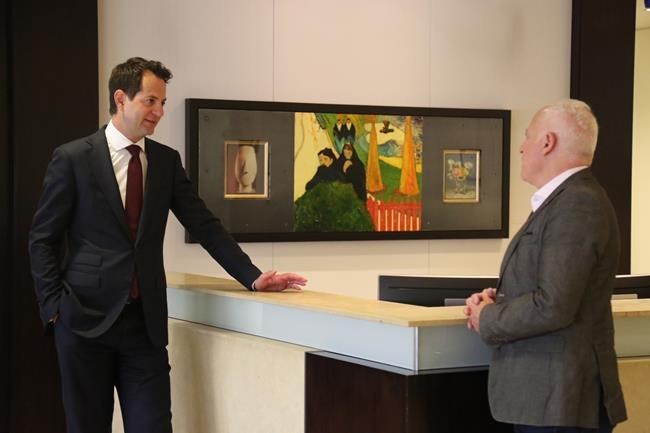
Adam Dean, left, founder of Dean Executive Search, is shown in this undated handout photo. Canadian companies on the hunt for new leaders to fill their C-Suite or senior ranks during the COVID-19 pandemic are experiencing longer search times and more intense negotiations, corporate governance and hiring experts say. THE CANADIAN PRESS/HO, Dean Executive Search *MANDATORY CREDIT*
June 06, 2021 - 7:00 AM
TORONTO - Canadian companies on the hunt for new leaders to fill their C-Suite or senior ranks during the COVID-19 pandemic are experiencing longer search times and more intense negotiations, corporate governance and hiring experts say.
Since the health crisis first spread through Canada last March, they have noticed candidates are reluctant to make a switch and those that are willing to take on a new role are harder to vet without the usual in-person interviews or dinners.
"Those roles are taking a lot longer to fill, and in my view, we are seeing that occur at perhaps the worst possible time," said Adam Dean, the founder of Dean Executive Search and a former investment banker.
The usual search period stretching between nine months and a year is now being prolonged, he said, and the extensions are happening as companies are facing extreme upheaval.
The pandemic has upended their business models, forced them to pivot on a moment's notice and sometimes, come amid both planned and unexpected retirements or departures in the top ranks.
The last year alone has seen senior staff from Air Canada, Shopify Inc., RioCan REIT and the Canada Pension Plan Investment Board all depart, forcing the companies to turn to succession plans or try to discover new talent while in-person board meetings and opportunities to mix and mingle have moved online.
Recruiting external candidates has become particularly tough because more people want to stay put during the crisis, said Richard Leblanc, a professor of governance, law and ethics at York University.
They see a dramatic employment shift during a pandemic as risky and they have loyalties or unvested equity they don't want to leave behind, he said.
Those open to a new gig, however, are facing a very different recruitment process than before.
Hiring senior staff used to involve three or four in-person interviews and often a dinner to learn more about a candidate's manners, ability to navigate social situations or deal with clients and even their family life, he said.
If the candidate shone through all those tests, references were often called as a gut check and a deal was signed.
Now, Leblanc sees companies calling references and close contacts for opinions at the start of the process. They will host the first one or two interviews with a candidate online and if COVID-19 protocols and comfort allow, hold a final interview or two in-person.
The dinners have moved online too, but with a twist.
"By that second or third interview I'm seeing cooking, I'm seeing drinks, because you're trying to mimic the dinner," Leblanc said.
Sometimes companies are even inviting the candidate's spouse to see what they can glean about how he or she might feel about their partner's potential new job, whether they're willing to move and their long-term goals.
But Leblanc said, "It's just not the same. When it comes to recruitment you want to look the person in the eye."
Candidates who make it all the way through the process have an edge in negotiations, Dean said.
"Candidates who are willing to move are coming at a premium, and those candidates who are ready to make a switch at this point in the cycle are commanding guarantees and they're dictating terms," he said.
Many, he has found, are looking for minimum annual compensation guaranteed over a length of time.
Leblanc has also heard of companies and candidates negotiating terms that help maintain a life-work balance or that put restrictions or allowances around remote work.
As vaccination becomes widespread and restrictions loosened, Leblanc envisions executive recruitment will return to its former timelines.
Companies will keep some elements from pandemic times like checking references early or doing one or two interviews virtually before flying someone out to meet in-person, he said.
"You're going to pick and choose what you like about the virtual environment, but we will not be going to back to normal completely."
This report by The Canadian Press was first published June 6, 2021.
Companies in this story: (TSX:AC, TSX:SHOP, TSX:REI.UN)
News from © The Canadian Press, 2021